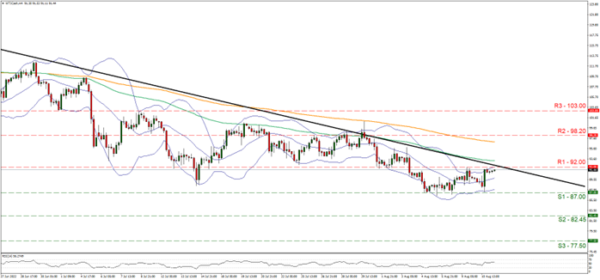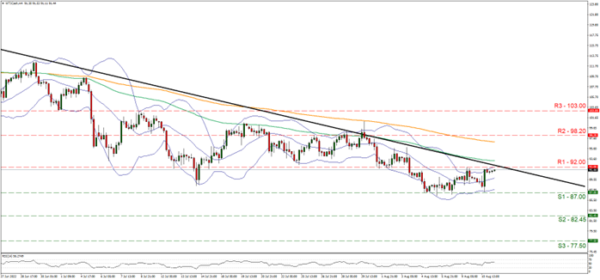WTI’s price was on the rise yesterday, yet overall seems to remain rather stable yet at lower levels than our last report as the price remains near $90 per barrel. It should be noted that the data released related to the US oil market tended to show a slack, as the EIA yesterday, showed that the was a built up of oil inventories in the US over the past week of 5.458 million barrels. Also the API weekly crude oil inventories figure last Tuesday, reported a built up of oil inventories for the past week, yet lower, at 2.156 million barrels. Also we would note that last Friday the Baker Hughes oil rig count showed that the number of active oil rigs in the US dropped by 7 reaching 598 which could be an indication of lower demand levels. Overall the figures stemming from the US seem to show that demand levels were not able to reach production of oil, which could have kept oil prices at relatively low levels.
High Gasoline Demand and weak dollar support oil prices
On the other hand, we highlight the drop of gasoline inventories levels, as drawdown of almost -5 million barrels was reported. The release implied a high demand for gasoline that could be translated to higher demand for crude oil in the future given that the demand levels for gasoline surpassed production and could force refineries to faster production levels. At the same time a Reuters report tended to imply that strong energy consumption is expected for the second half of the year that could boost oil prices in the coming months if realised. Also on a fundamental level we note that the US CPI rates for July dropped weakening the USD, which may also support the dollar denominated commodity’s price.
Druzhba pipeline resumes oil flow
The news that flow of oil from Russia to Europe has resumed through the Druzhba pipeline may have helped to keep oil prices at low levels. It should be noted that the flow was disrupted at the southern part of the pipeline which was going through Ukraine to parts of central Europe. The disruption occurred about a month ago and had intensified worries for the supply of the commodity to Europe which could intensify the energy crisis in the continent. The resumption of supplies tended to ease market worries about the supply side of the commodity and thus may have not allowed oil prices to ascend higher.
Iran nuclear deal near
Also on a fundamental level, we note that the US and Iran seem to be nearing a possible deal for the continuation of Iran’s nuclear program. The two sides seem to be nearing an agreement on restoring Iran’s 2015 nuclear deal, after another round of talks practically ended with a final text being drawn by the EU. Despite some Iranian objections to the text, there is some slight optimism that the two sides will be reaching an agreement. For the time being the text has been forwarded to the capitals for approval, which is to be another risky process. Should the two sides actually reach a deal, we may see oil prices dropping as the agreement would allow Iran to re-enter the global oil market as a major international supplier.
OPEC’s monthly report
Also today we note the release of the OPEC monthly report that could interest oil traders. It should be noted that the OPEC Monthly Oil Market Report (MOMR) discusses major issues affecting the world oil market especially in regards to expected demand and production levels for the coming year as well as the oil market balance, which could affect the market’s mood for the commodity’s price, as it would allow for an insight in the possible actions of the organization. Should the report show a meagre increase in the global demand for oil being anticipated, we may see the commodity’s price dropping, while a tightness in expected production levels could push oil prices higher.
Technical Analysis
WTI H4
WTI’s price retreated at some point below the reading of $90 per barrel, yet seems to remain rather stable near that level currently. It’s characteristic that the commodity’s price remained in a sideways movement between the 92.00 (R1) resistance line and the 82.45 (S1) support line, since the 3rd of August. We tend to maintain our bias for a sideways movement of WTI’s price currently and as long as the price action respects the pre-mentioned levels. On the other hand, we highlight that the commodity’s price is on a collision course with the downward trendline that has been guiding WTI’s price action since the 14th of June. It should be noted that the RSI indicator below our 4-hour chart is running along the reading of 50 also implying a rather indecisive market for the time being. Should bulls take over the initiative for WTI’s price, we may see it breaking the 92.00 (R1) resistance line which forms the upper boundary of its current sideways motion and aims for the 98.20 (R2) level that provided resistance on the 26th and 28th of July. Even higher we note the 103.00 (R3) resistance barrier that was aimed for on the 8th of July. Should the bears be in charge of the commodity’s price, we may see it breaking the 87.00 (S1) support line that is currently the lower boundary of its sideways movement and take aim for the 82.45 (S2) support level, while even lower we note the 77.50 (S3) support hurdle.



 Signal2forex.com - Best Forex robots and signals
Signal2forex.com - Best Forex robots and signals




